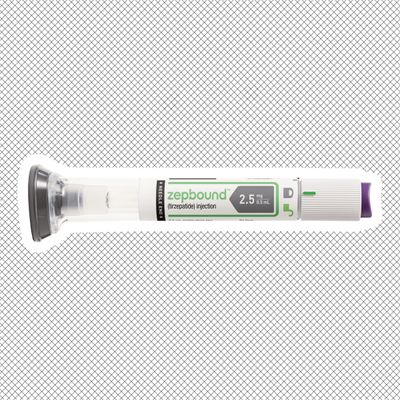
While Ozempic continues to surge in popularity, there’s another diabetes drug and weight loss agent on the rise. The Eli Lilly–manufactured drug tirzepatide hit the market in May 2022 under the brand name Mounjaro, a prescription injectable to regulate the blood sugar of people with type 2 diabetes. But it quickly garnered mainstream interest for its secondary outcome: helping patients lose weight more effectively than Ozempic or Wegovy. The drug’s boom in popularity has led to monthslong shortages, making it harder to access for diabetes patients. But in November, the FDA approved tirzepatide for weight loss under the brand name Zepbound.
Eli Lilly has said Zepbound will be available in the U.S. by the end of the year. With many already using Mounjaro off-label for its weight-loss benefits, experts anticipate Zepbound’s high efficacy and minimal short-term side effects could make it one of the most popular weight-loss drugs on the market. “I’m inundated with I can’t even tell you how many emails per day asking about Zepbound,” says Dr. Caroline Messer, an endocrinologist at Fifth Avenue Endocrinology and the founder of metabolic wellness center Well by Messer. “I appreciate that patients are more aware of their weight and lifestyle and there’s a greater emphasis on trying to be healthy,” says Dr. Reshmi Srinath, a New York–based endocrinologist and the director of obesity medicine at Mount Sinai, who saw a similar spike of interest from patients in the months following Mounjaro’s approval. But at the same time, “We have to be careful about utilizing these medications, which can be very potent and aggressive. None of these are magic pills.” Here’s what to know about tirzepatide’s side effects, cost, and long-term use.
How are Zepbound and Mounjaro different from Ozempic?
Wegovy, Ozempic, Mounjaro, and Zepbound all promote weight loss by decreasing appetite. But while semaglutides like Ozempic and Wegovy work on one hormone — glucagon peptide 1, or GLP 1, which comes from the small intestine and regulates blood sugar and appetite — tirzepatide is unique in that it works on both GLP-1 and a second hormone, gastric-inhibitory polypeptide, or GIP, which secretes insulin. “There’s sort of a synergy between these two hormones in the gut,” says Dr. Srinath.
Tirzepatide’s two-pronged approach is what leads to such profound weight loss. According to the FDA, patients in a clinical trial who used Zepbound at its highest dose lost an average of 18 percent of their body weight, while patients using Wegovy lost 15 percent. That said, it doesn’t work for everyone, and Dr. Srinath has patients who don’t respond to it all.
Who is eligible for Mounjaro and Zepbound, and how much do they cost?
Patients with type-two diabetes are eligible for Mounjaro, and the FDA has approved Zepbound for adults with a minimum BMI of 30, or 27 if a patient also has a weight-related condition, such as high blood pressure, heart disease, sleep apnea, or prediabetes.
Even if you do qualify, Dr. Messer warns you’ll likely need preauthorization from your insurance company to get coverage. Without insurance, the cost of both Mounjaro and Zepbound is steep: more than $1,000 for a month’s supply. Eli Lilly offers Mounjaro coupons to offset costs and will offer similar commercial savings for Zepbound.
What are Mounjaro and Zepbound’s side effects?
Like the popular semaglutides on the market, most of tirzepatide’s immediate side effects are gastrointestinal: constipation, gastroesophageal reflux disease, and nausea that heightens the day after injection. Even if side effects seem minor, Dr. Barrie Weinstein, an endocrinologist and the medical director of Well by Messer, advises any patient who experiences recurring symptoms, particularly persistent nausea and vomiting lasting days after the injection, to see their doctor, as both issues can impact a patient’s ability to hydrate or intake nutrition. That said, “I do tend to see less nausea with tirzepatide than semaglutide,” says Dr. Weinstein.
There are also consequences of decreased appetite, which can be so extreme that Dr. Weinstein advises patients to set up reminders to force themselves to eat. A smaller appetite can mean a loss of lean body mass and muscle. According to the New York Times, weight-loss injectables like Ozempic can lead to malnourishment; Dr. Weinstein says that risk is potentially greater with tirzepatide since it suppresses hunger even further. To avoid headaches and fatigue, “It’s even more important that you’re getting enough protein throughout the day,” says Dr. Weinstein.
What about long-term side effects?
Long-term side effects of these newer drugs are not yet widely known. “Tirzepatide is the first in its class because it works on two gut hormones, not just one, so you can argue the long-term side effects compared to GLP-agonists like Wegovy or Ozempic could be different. But like those drugs, they’re working on hormones that naturally occur in the body,” says Dr. Weinstein, who nevertheless remains optimistic that the medication’s long-term side effect profile will be the same as that of semaglutides.
So what can you expect? Dr. Messer says developing gallstones is a possibility, but like thinning hair, it comes with the territory of rapid weight loss. “All that cholesterol that’s being lowered flushes through the liver and gallbladder,” Messer explains. “I always say if you’re committed to weight loss, you have to be committed to the possibility of gallstones.” A study conducted on rodents also showed an increased risk of medullary thyroid cancer, which is also a risk of taking semaglutides. The FDA advises individuals with personal or family histories of medullary thyroid cancer against taking the drug.
What happens if you stop using tirzepatide?
Dr. Messer says tirzepatide’s myriad benefits don’t last after you stop injecting, which is why she recommends patients on the drug also work with trainers and dietitians to make lifestyle changes. According to Dr. Weinstein, patients who have experienced “more recent weight gain without a history of weight struggle” may be able to maintain weight loss with diet and exercise, while patients with lifelong weight-loss struggles will most likely need to be on these drugs “forever in order to maintain goal weight.”





